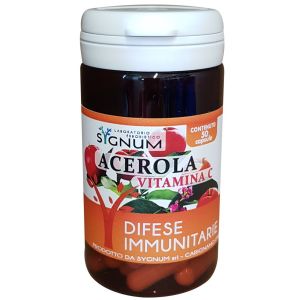Ship in Europe, Find out rates!
Sygnum Acerola Immune Defense Supplement 50 capsules

- box Delivery in Italy in 24/48 and free returns
- star3.000+ positive reviews
- dropboxOver 60,000 products in the catalog
Characteristics
Plant very rich in ascorbic acid (vitamin C), also accompanied by other organic acids. The content of flavonoids and especially anthocyanins is important.
The fruits of this plant also contain vitamins B1, B2, B3, B5, B6, provitamin A and various mineral salts including iron, calcium, phosphorus, potassium, magnesium; in particular, they have twice as much magnesium and pantothenic acid as oranges and almost the same amount of provitamin A as carrots.
Acerola is a typical plant of the Caribbean area and of Brazil, it is cultivated in other countries with a warm temperate climate.
◦ Main action: antioxidant/anti-radical;
◦ Other actions: immunostimulant, antianemic.
Vitamin C is essential in many oxidative processes, such as the synthesis of collagen and carnitine, and also promotes intestinal absorption of iron. It is also important for the functions of the immune system, because it stimulates the functioning of the cells that defend our body from infections.
Acerola is particularly suitable for preventing and combating flu syndromes, colds and respiratory tract infections, as well as stimulating the immune system and being useful in all cases of asthenia, convalescence and vitamin deficiencies.
The daily requirement of vitamin C is about 60mg, much higher doses are required during pregnancy and lactation, in senile states and in the course of infectious diseases.
In some groups of patients, such as subjects subjected to constant physical activity and cold climates, supplementation with doses of 1-2 g/day of vitamin C reduced the duration and severity of infectious episodes.
Vitamin C inhibits the growth of tumors not because it prevents DNA damage caused by free radicals but it impairs the ability of the tumor to grow under certain conditions.

